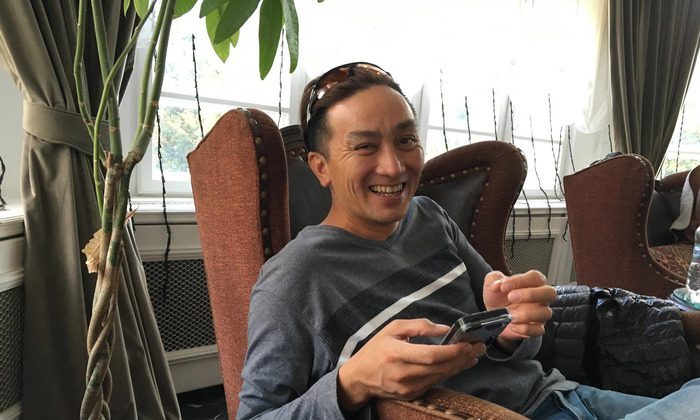Enrique Alejandro Velez passed away on March 20, 2017. A treasured GLOBIS alumnus (2014 – 2016), he was an inspiration to his classmates and the greater GLOBIS community. This article is from an interview conducted shortly before he passed away and is published as an expression of our deepest condolences. He will be missed.
As executive director and senior vice president of digital communications at JCE Japan Creative Enterprise, Enrique Velez has long been inspiring leaders in Japan. GLOBIS faculty Cristian Vlad sat down with him to discuss how logic and emotion can be used together to help clients believe in themselves, their future products and services, and the value they create for the society.
CV: Can you tell us how you became interested in communications?
EV: I’ve always been interested in communications, though I didn’t always realize it. I come from the financial industry, where everyone believes in numbers, data, and logic. I’m still a strong believer in all these to a certain extent, but I’ve realized during the time I’ve spent in Japan that numbers, data, and logic are not always enough when trying to motivate people through difficulties and change.
People are emotional creatures, extremely sensitive, visual, and reactive to their own perceptions. They understand what there are told, but they only trust what they feel. Therefore, when you try to help people through change and growth, just showing them the numbers is far from enough. Organizations need to learn how to create perceptions: customer perceptions, employee perceptions. People need to feel the earth, to smell the air, to see the view from the other side. Then, and only then, people will believe in change. They will believe in their own selves, and they will want to learn, to change, and to grow.
Communications is much more than mere public relations or employee engagement. It is art. It is the dexterity that all successful people and organizations need to master in order to make significant progress.
CV: And you believe communication should be digital?
EV: It doesn’t have to be only digital, but that is where the world is going. Let me ask you, how many hours a day do you spend online, browsing the web, or interacting on SNS? How many hours do you spend watching TV? Reading newspapers?
What I’m saying is that our media is diversifying so rapidly and, obviously, the digital element is playing an increasing role in our lives. Businesses oblivious to this reality end up coming short of meaningful customer engagement, so they lose business by the minute. Especially in Japan, the country where so much technology is invented, manufactured and sold, so many corporations seem to come short of meaningful customer engagement.
It’s a paradoxical. Traditionally, media has been an opportunity to communicate to customers. Today, successful communications are all about integrating those customers, bringing their perspectives into the process of innovation, product, and service development, and nurturing ecosystems of co-creation and idea embodiment.
CV: Can you tell me a bit about where your main struggle is when trying to convince people and organizations about the importance of digital transformation?
EV: Digital transformation is on everybody’s lips these days. It is the new slogan in town. Many people, though, do not understand what it really is, what it really means to their clients, and the impact it has on their business. For me, the real struggle begins when I try to help businesses understand that it is not enough to apply digital lipstick to their on-going strategy and move on with business as usual. Sometimes, getting financial commitment and getting emotional buy-in are two separate issues. It takes two different mindsets to speak to both sides of the brain. It takes a lot of commitment to help clients develop the mental bandwidth needed for thinking differently and nurturing new emotions.
I always ask my clients, “Do you know what you love to do?” and then I ask, “Do you know what your customers love to do?” I am not talking logic here. I am talking love. Life is nothing without it, and that goes for business, too.
CV: Where do you find the patience for communicating these ideas?
EV: Everyday life. My experience as a student at GLOBIS. My interaction with clients at JCE. Many of my friends tell me that I have changed over these past years, that I have become a much better listener, more introspective and considerate. I, too, feel that I have changed. I am now working with clients and partners in Romania, Croatia, Moldova, Bulgaria, Russia, and Thailand. Places I always thought I would visit on a holiday!
Every time I interact with people from those countries, I am reminded that there is always a third and a fourth layer to reality, to knowledge, and to perception. We are all tempted to believe that the world we know is the world everyone knows, that our own values are shared by people, customers, and employees all across the globe. The illusion created by our rapidly digitized media is extremely tempting, but the reality is so much more complex. This is where truly successful communicators step in to bridge those realities and create new and modern platforms for people to engage and co-create.
CV: Where do you get your motivation, may I ask?
EV: The world is full of kindness, and this drives me to be the best for the world. I am determined and focused to develop people, to help them grow as a coach and as a leader. I always try to engage people, making them feel like they are part of something bigger than themselves, resulting in a sense of teamwork and community in all of the organizations and projects I am involved in. I have worked with amazing people in Toronto, Vancouver, and now Tokyo, Bucharest, Zagreb, Cluj, Chicago, and Bangkok. I draw my energy from the people I work with, and I strive to give as much as I get back in return.
I have learned to go beyond numbers and to give meaning to life. I trust the smiles of the faces of our happy customers. I trust their laughter and their handshakes. It is a lengthy process and a hard stage to reach, but every single moment of the journey is extremely precious. There is a new piece of learning in every interaction, and I treasure every step of the way.
CV: One last question. Based on your experience working in Japan, how would you advise GLOBIS students and young entrepreneurs around the world?
EV: Life is short, so do what you love and do it often. If you don’t know what you love, don’t settle. Just keep trying, living, and doing. You will know your mission when it comes along. But you will never find it if you settle.
Furthermore, please remember that teams win, not individuals. Put yourself out there and be part of awesome teams. Life is about the people you meet, and the things you create with them, so go out and start creating. Live your dream, and wear your passion.



